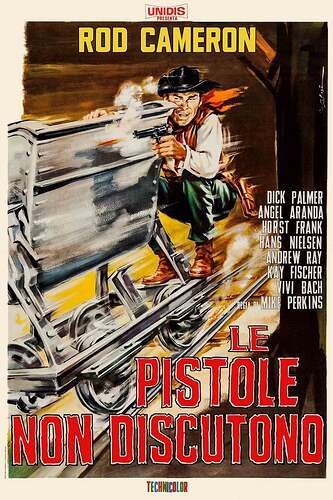Still, if I have to believe some writers, that’s exactly what happened: two films arranged together (or one as a result of the other), so one could ride off the costs of the other
The story emerges in : Casadio - Se sei vivo spara! Storie di … (Ravenna, 2004) and he quotes (believe it or not) Giusto’s DIZIONARIO:
<< i Leone produces his film with the left-overs of Caiano’s budget [/i] >>
Casadio personally writes in his main text:
<< (talking about LE PISTOLE …): It’s a decent film, no more, that wasn’t succesfull, but one with a curious history. The left-overs of this film’s budget are given to Sergio Leone to direct PER UN PUGNO DI DOLLARI, which would have an enormous succes and gives the producers, so to speak, a bonus to cover the money they lost on Caiano’s movie >>
The story pops up again on the Italian spaghetti western database:
http://www.spaghettiwestern.altervista.org/pistolenodiscutono.htm
(I translate the beginning of the second paragraph):
<< The film is important from a historical point of view because it was meant to be a challenge to the American western, but instead “Jolly Film” decided to use the financial left-overs for this film for the production of a second one, mainly for accountancy reasons: PER UN PUGNO DI DOLLARI (…)>>
The question still is, of course: what or who is the original source for all this? An interview? With one of the Italian producers, Colombo and/or Papi? It’s a well-known fact that they had problem with most people they worked with, including Eastwood and Leone. Moreover people have selective memories, and some people’s memories are more selective than others. Add this to the fact that ventures in Italy - certainly ventures of this kind - usually are all but transparent. Often you hear things like : We have the money, nobody knows were it comes from, so we better spend it before somebody else does."



 or possibly neither !! That was the only “scandal” in Rod’s CV
or possibly neither !! That was the only “scandal” in Rod’s CV